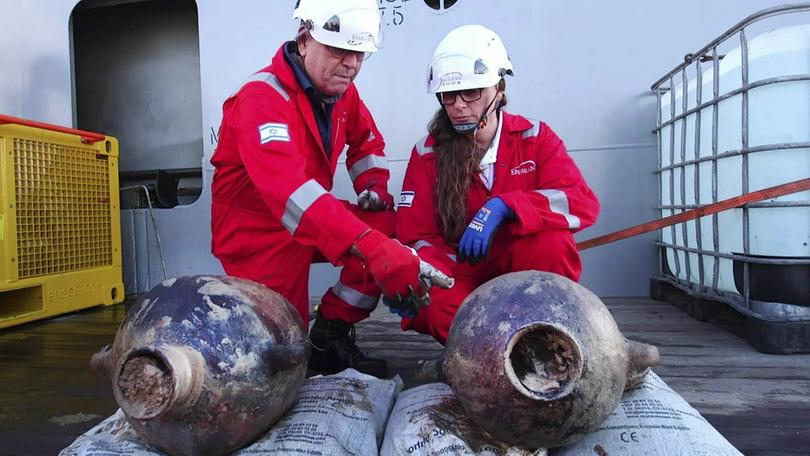JERUSALEM, Israel – A London-based energy company exploring the floor of the eastern Mediterranean has discovered the world's most ancient ship ever found in the deep seas.
The ship contains completely intact pottery vessels used for storage, and is believed to be between 3,300 and 3,400 years old – perhaps just before the time Moses led the Israelites out of Egypt.
Workers for the Energean company found the ship in an extremely deep area of the sea, more than a mile below the surface and between 50 and 60 miles from the coast. Energean was taking a routine survey of the sea floor, and when the ship was found, it launched a mission to extract samples of the cargo, identified as Canaanite vessels from the Late Bronze Age.
The Israel Antiquities Authority (IAA) will conduct further investigations of the unique discovery.
Jacob Sharvit, who heads the IAA's Marine Unit, explained, "The ship seems to have sunk in crisis, either due to a storm or to an attempted piracy attack – a well-known occurrence in the Late Bronze Age."
He added, "This find reveals to us as never before the ancient mariners' navigational skills, capable of traversing the Mediterranean Sea without a line of sight to any coast. From this geographical point, only the horizon is visible all around. To navigate, they probably used the celestial bodies, by taking sightings and angles of the sun and star positions."
Dr. Karnit Bahartan, the lead environmental scientist for Energean, recalled, "About a year ago, during a survey, we saw the unusual sight of what appeared to be a large pile of jugs heaped on the sea floor. We are in ongoing contact with the Israel Antiquities Authority, and when we sent them the images it turned out to be a sensational discovery, far beyond what we could imagine."
After the company's technicians orchestrated a complex operation to bring up samples, they found, according to the IAA's Shavit, "The vessel type identified in the cargo was designed as the most efficient means of transporting relatively cheap and mass-produced products such as oil, wine, and other agricultural products such as fruit."
Sharvit explained that two other ancient shipwrecks with cargo from the Late Bronze Age were previously discovered in the Mediterranean, but both of them were located near the coast of Turkey.
The significance of the present deepwater find, according to Sharvit, is that "the academic assumption until now was that trade in that time was executed by safely flitting from port to port, hugging the coastline within eye contact. The discovery of this boat now changes our entire understanding of ancient mariner abilities: it is the first to be found at such a great distance with no line of sight to any landmass."
The IAA plans a series of tours to view the vessels. Director Eli Escusido noted, "The important significance of these finds prompted a decision to exhibit these Canaanite vessels extracted from the sea floor, and thus to tell the public the story of this boat, in the framework of opening the Archaeological Campus for 'sample taste' tours this summer."
Escusido continued, "These visits will afford people a glimpse of this unique edifice, its mosaics, and laboratories, even before the official opening of our expansive visitor center, scheduled two years from today."
John Waage has covered politics and analyzed elections for CBN New since 1980, including primaries, conventions, and general elections. He also analyzes the convulsive politics of the Middle East.
Originally from the Christian Broadcasting Network
CCD edited and reprinted with permission












